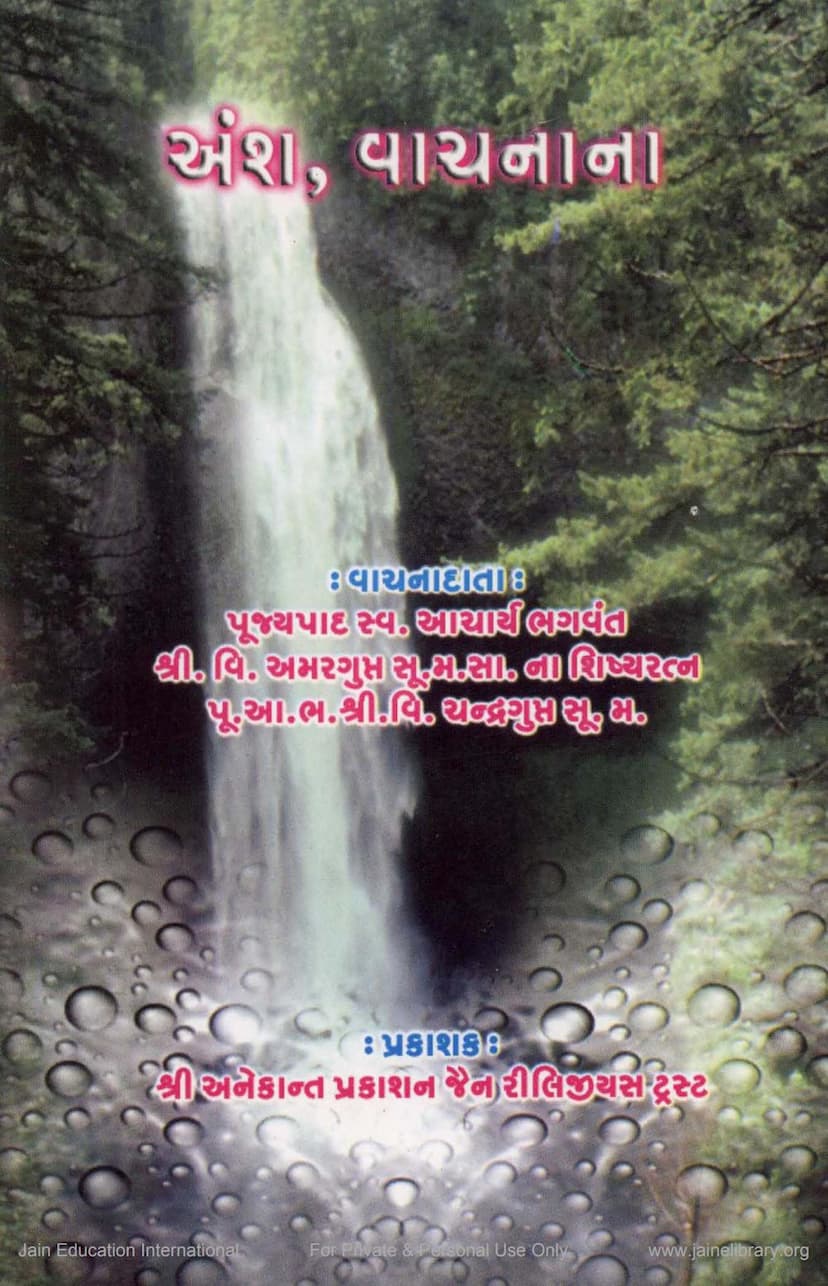Ansh Vachnana
Added to library: September 1, 2025

Summary
The Jain text "Ansh Vachnana" (Fragments of Discourses) authored by Chandraguptasuri, published by Anekant Prakashan Jain Religious Trust, serves as a collection of profound spiritual teachings and guidance for spiritual seekers. The book is presented as a second edition, published in V.S. 2059, with a print run of 1000 copies.
The text emphasizes the Jain principles of detachment from worldly pleasures and the pursuit of spiritual liberation (moksha). It highlights the importance of recognizing the transient nature of worldly happiness and the suffering inherent in the cycle of birth and death (samsara).
Key themes and teachings within "Ansh Vachnana" include:
- True Guru Identification: The text differentiates between true spiritual guides who focus on the soul's welfare and those who focus on worldly concerns. It stresses the importance of seeking guidance from gurus who are genuinely concerned with one's spiritual liberation, regardless of whether their advice is pleasing or not.
- Detachment from Samsara: The book repeatedly urges readers to detach themselves from worldly attachments and desires, which are identified as the root cause of suffering. It describes samsara as inherently painful and encourages renunciation of worldly comforts and relationships in favor of spiritual pursuits.
- The Essence of Dharma: Dharma is presented not as a means to attain worldly happiness or alleviate temporary suffering, but as a path to transcend the cycle of samsara and achieve liberation. The focus is on purifying the soul and eradicating karmas.
- The Significance of Right Conduct: The text elaborates on various aspects of Jain conduct, including the importance of compassion, non-violence (ahimsa), truthfulness, and restraint. It critiques superficial religious practices and emphasizes the need for genuine inner transformation.
- The Role of Renunciation (Sanyam): The path of a monk or nun (sanyam) is presented as the ideal path to spiritual liberation. However, the text also outlines the duties and responsibilities of a layperson (shravak) who aspires to progress spiritually, urging them to adhere to Jain principles as much as possible.
- Karma and its Consequences: The text underscores the law of karma, explaining that all experiences of happiness and suffering are a result of one's own past actions. It advises against blaming external factors and emphasizes the importance of accepting the consequences of one's karma while striving to prevent future negative karmas.
- The Impermanence of Worldly Possessions: The book highlights the fleeting nature of wealth, relationships, and worldly pleasures, urging readers not to get overly attached to them. It encourages the proper use of wealth through acts of charity (dana) and spiritual pursuits.
- The Power of Inner Transformation: The core message revolves around the necessity of inner purification and the transformation of one's mindset. External religious rituals are considered secondary to the cultivation of virtues like equanimity, compassion, and detachment.
- The Importance of Guidance and Obedience: The text stresses the critical role of listening to and following the teachings of enlightened beings (gurus and Tirthankaras). It emphasizes that true spiritual progress comes from understanding and adhering to their divine guidance.
- The Imperative of Self-Reflection: Continuous self-reflection and introspection are encouraged to identify one's faults and work towards their eradication. The text advises against making excuses for one's shortcomings and instead promotes sincere self-correction.
In essence, "Ansh Vachnana" is a compilation of insightful discourses aimed at guiding individuals towards spiritual enlightenment by fostering detachment from the material world, cultivating virtuous conduct, and unwavering devotion to the principles of Jainism. The underlying message is that true happiness and liberation lie in self-mastery and the pursuit of the soul's inherent purity, rather than in the fleeting pleasures of the material realm.